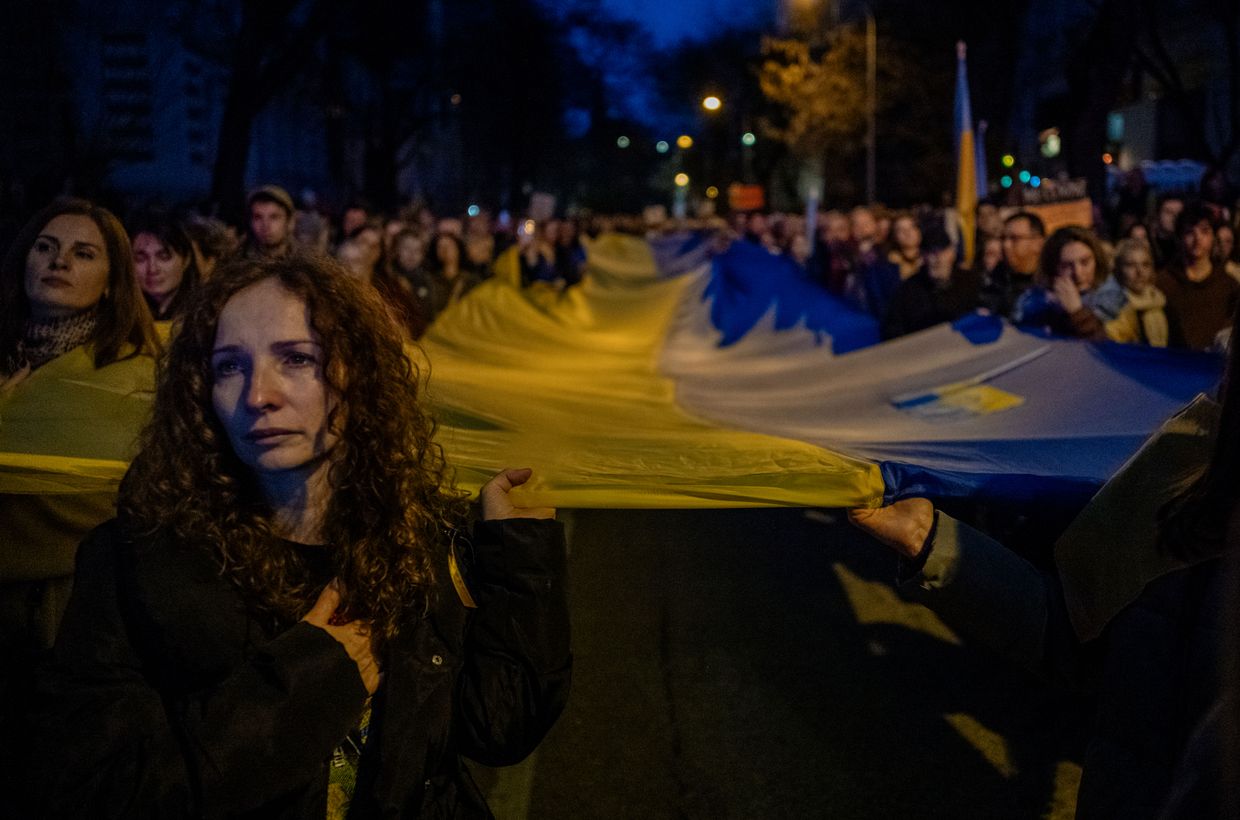"(T)he presence at the Victory Parade of a country that bombs cities, hospitals, and daycares, and which has caused the deaths and injuries of over a million people over three years, is a shame," Polish Prime Minister Donald Tusk said.
"According to the participants of the performances, their goal is to remind the civilized world of the barbaric actions of Moscow, which for many years and decades has systematically violated international law," a source in Ukraine’s military intelligence agency (HUR) told the Kyiv Independent.
"I have great hope that an agreement for a ceasefire in Ukraine will be reached this weekend," German Chancellor Friedrich Merz said on May 9, shortly before traveling to Kyiv alongside the leaders of France, Poland, and the U.K.
U.K. Prime Minister Keir Starmer, French President Emmanuel Macron, German Chancellor Friedrich Merz, and Polish Prime Minister Donald Tusk will arrive in Kyiv early on May 10.
The United States embassy in Kyiv on May 9 issued a warning that Russia could launch "a potentially significant" attack in the coming days, despite Putin's self-declared Victory Day "truce."
The sanctioned oil tankers have transported over $24 billion in cargo since 2024, according to Downing Street. The U.K. has now sanctioned more shadow fleet vessels than any other country.
The sanctions list includes 58 individuals and 74 companies, with 67 Russian enterprises related to military technology.
Washington and its partners are considering additional sanctions if the parties do not observe a ceasefire, with political and technical negotiations between Europe and the U.S. intensifying since last week, Reuters' source said.
Despite the Kremlin's announcement of a May 8–11 truce, heavy fighting continued in multiple regions throughout the front line.
Putin has done in Russia everything that Luiz Inacio Lula da Silva had been against in Brazil.
Slight majority of Hungarians support Ukraine's accession to the EU, poll finds

A narrow majority of Hungarians support Ukraine's accession to the EU, according to a Republikon Institute poll published by the Hungarian newspaper Nepszava on April 7.
The survey, conducted between March 26 and April 1, shows that 47% of the respondents support Ukraine’s accession to the European Union, and 46% oppose it.
When excluding respondents who were undecided, the result shifts to 51% versus 49%.
Among the supporters, 32% said they would support Ukraine’s membership if it followed the standard procedures applied to other candidate countries with a 7 to 10 year accession period.
Only 15% expressed support for a fast-tracked accession process, which would potentially allow Ukraine to join within 3 to 4 years.
The results come despite Hungary being seen as one of the most Russian-friendly members of the EU.
Hungarian Prime Minister Viktor Orban has consistently obstructed sanctions against Moscow and military aid for Kyiv while opposing Ukraine’s accession to the bloc.
Hungarian state-run media spreads anti-Ukrainian narratives using headlines such as “Even cholera has not completely disappeared in Ukraine” and “Ukraine's EU accession could bring a pension disaster to Hungary.”
In one of the latest governmental advertisements with the caption “Voks 2025 – vote on Ukraine’s EU membership,”President Volodymyr Zelensky, EU Chief Ursula von der Leyen, and German politician Manfred Weber were depicted in front of a red cross.
The headline read: “We will not let them decide over our heads!”
Support for Ukraine’s EU membership in Hungary shows clear political divides.
Among pro-government Fidesz-KDNP voters — the ruling conservative alliance — a large majority (82%) oppose membership.
The far-right Mi Hazank party’s voters are also mostly against (73%), but 27% would accept Ukraine’s membership if it follows standard EU procedures.
In contrast, voters of the centrist opposition movement Tisza are more supportive. A combined 79% back Ukraine’s accession, including 52% who favor the regular 7–10 year process and 25% who support fast-tracking.
Among voters of other opposition parties, 71% are supportive overall.
On March 7, Orban announced plans to hold a referendum in Hungary on Ukraine’s EU accession though no date has been set.

Most Popular

After 3 years of full-scale war in Ukraine, Europe announces plan to ban all Russian gas imports

Ukraine, Europe's ceasefire proposal includes US security guarantees, no recognition of Crimea, Reuters reports

Journalist Roshchyna's body missing organs after Russian captivity, investigation says

After Russia's deadly attack on Kyiv, Vance reposts denunciation of Zelensky

Ukrainian sea drone downs Russian fighter jet in 'world-first' strike, intelligence says
Editors' Picks

How medics of Ukraine’s 3rd Assault Brigade deal with horrors of drone warfare

As Russia trains abducted children for war, Ukraine fights uphill battle to bring them home

'I just hate the Russians' — Kyiv district recovers from drone strike as ceasefire remains elusive



